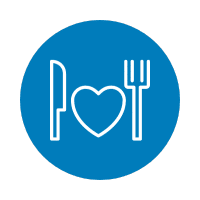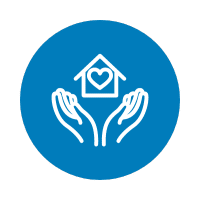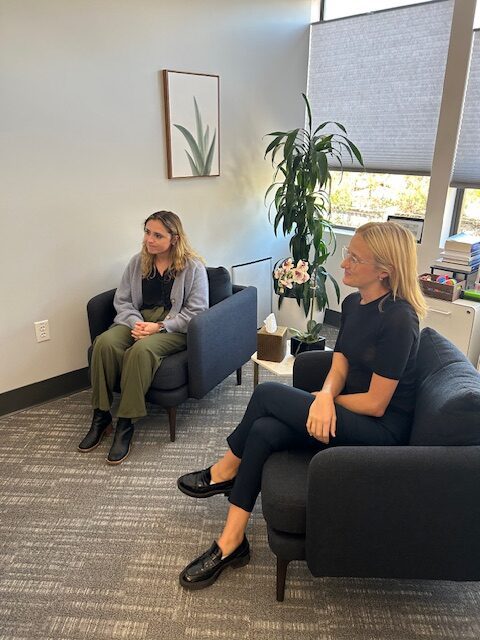Eating Disorders
Not sure if you need help?
Signs It’s Time to Get Help:
Personalized Treatments

Nutrition counseling
Certified dietitians help restore normal eating patterns and teach the importance of nutrition and a balanced diet.

Healthy Living Group
Along with nutrition education, you’ll learn the roles that physical activity, sleep, stress reduction, and mindfulness play in supporting the journey toward recovery and health.

Psychotherapy
Through a combination of cognitive-behavioral therapy and behavioral therapy, psychotherapy helps patients develop healthier attitudes toward food and weight while equipping them with effective ways to cope with stressful situations.

Medication
Certain antidepressant medications like selective serotonin re-uptake inhibitors (SSRIs such as Prozac and Paxil) and other non-antidepressant medications might be used to help control anxiety and depression associated with an eating disorder.

Group Therapy
Our therapy groups are led by experts in their field who have dedicated their lives to helping others. People with eating disorders might benefit from group therapy, where they can find that they are not alone, openly discussing their feelings and concerns with others who share common experiences and problems.

Family Therapy
Group meetings and education are available to our clients' partners, spouses, and children as part of our inclusive treatment strategy. Family therapy is part of an overall treatment program and is very important to success. Family members will learn more about eating disorders and recognize its signs and symptoms so they can support their loved one’s treatment.

Supportive Housing
A supportive group home environment may be an option for adults on their mental health wellness journey.
Based on your specific needs and diagnosis, we offer comprehensive and effective programs to help you find relief now and into the future. They include a continuum of care from outpatient to intensive patient, partial hospitalization programming to supportive housing.
Intensive Outpatient Program (IOP)
Personalized and multidisciplinary IOP programs are designed to address mental, emotional, physical, and spiritual needs. In-person, virtual, and hybrid sessions are available for those needing greater flexibility.
3 Day IOP
Includes a minimum of 10 hours of treatment per week, comprised of six or more 90-minute therapy groups.
4 Day IOP
Includes at least two additional group therapy sessions of three hours or more.
5 Day IOP
Includes a minimum of two group therapy sessions or three hours of therapeutic treatments per day.
Includes:
Individual psychotherapy sessions minimum once per week
Psychiatric medication prescription and management
Family sessions (generally bi-weekly)
Case management services of up to two (2) hours per month.
Family work, parent consultation
Psychological testing
Partial Hospitalization Program (PHP)
The PHP program provides intensive support without 24-hour supervision. As an alternative to a hospital or residential program, PHP offers comprehensive, short-term treatment with a complete team of clinicians under one roof. The full-day program is attended 4–5 days a week.
Conditions Addressed
Depression, Anxiety, Bipolar & Other Mood Disorders
Borderline & Other Personality Disorders
Substance Dependence & Co-occurring Disorders
Trauma & PTSD
Interpersonal Conflict
And More
Services Provided
Individual Psychotherapy
Family Therapy
Case Management
Group Therapy
Psychiatric Intervention: Medication, TMS & More
Supportive Housing*
Group Therapy
Learn about coping strategies to reduce anxiety symptoms and gain a better understanding of the thoughts, feelings, and behaviors that perpetuate anxiety—all within a caring and supportive environment.
What You’ll Learn
Effective social skills
Anxiety management skills
How to develop an understanding of others
Communication skills
The steps toward positive growth
How to define and create a path to achieve your goals
What You’ll Gain
A deepened self-awareness
Improved relationships
Structure for daily, short-range, and long-range commitments
New effective and creative life skills
Emotional stabilization and symptom reduction
The ability to identify the next step
We’re dedicated to providing valuable information and support for anyone who is struggling with mental health issues. Our extensive options for group therapy are led by highly experienced medical professionals. Explore our informative articles to help you better understand and manage your anxiety. Our goal is to provide a safe and supportive community where you can learn, connect, and grow.
Group Therapies
Discover our group therapy options, specially designed to equip you with essential skills and tools to manage your well being for the long term. Our sessions are led by a team of highly-qualified and experienced professionals committed to providing you with the highest quality care.






